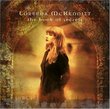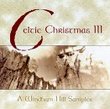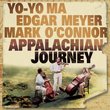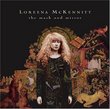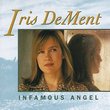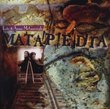| All Artists: English Anonymous, Anonymous 4 Title: The Lily and the Lamb: Chant and Polyphony from Medieval England Members Wishing: 0 Total Copies: 0 Label: Harmonia Mundi Fr. Release Date: 8/22/1995 Album Type: Import Genres: Pop, Classical Styles: Vocal Pop, Opera & Classical Vocal, Chamber Music, Historical Periods, Classical (c.1770-1830) Number of Discs: 1 SwapaCD Credits: 1 UPC: 093046712525 |
Search - English Anonymous, Anonymous 4 :: The Lily and the Lamb: Chant and Polyphony from Medieval England
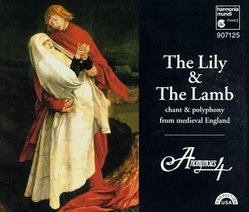 | English Anonymous, Anonymous 4 The Lily and the Lamb: Chant and Polyphony from Medieval England Genres: Pop, Classical
The disc's title refers to Mary and her son, the Christ, which is the general theme of the medieval chant, polyphony, and poetry that forms this program. The selections are ordered around three 13th century "sequences" t... more » |
Larger Image |
CD DetailsSynopsis
Amazon.com essential recording The disc's title refers to Mary and her son, the Christ, which is the general theme of the medieval chant, polyphony, and poetry that forms this program. The selections are ordered around three 13th century "sequences" that describe Mary's experiences at the foot of the cross. You can get deep into the mechanics and musicological aspects of this fascinating music, or you can just listen. This is music that speaks to everyone, and the mere sound of these voices, whether in their incredibly pure and perfect unison or multi-colored polyphony, can touch places within that otherwise rarely resonate. There's also something reassuring about connecting in this way with struggling souls of the distant past whose cares and hopes were much like ours. They survived largely due to their faith and its proclamation through music such as this. --David Vernier Similarly Requested CDs
|
CD ReviewsUnearthly Beauty W Bellomy | Austin, Texas | 07/11/2000 (5 out of 5 stars) "As a lover of music - though I prefer Blues to opera - I found this CD a classic to rank with the best of chant (my second favorite vocal genre). The voices are sublime, both in themselves and in their unison. This is absolute proof that the human voice is a beautiful instrument.The recording is live and present, very real. The music is eternal and transcendent.Can't say what spiritual connection there is for me - I belong to an older faith - but there is a spiritual grandeur in this music, just as in Gregorian or Byzantine chant, in Bach, or in any music that speaks from a depth. If you need music to remind you that there is much in the cosmos that is greater than the daily trudge, that there is beauty that endures, this is a good choice." Astonishing beauty FrKurt Messick | Bloomington, IN USA | 10/11/2005 (5 out of 5 stars) "Like several other of the Anonymous 4 CDs, this one entitled 'The Lily & the Lamb' is a collection of chant and polyphony from medieval England. 'The Lily' is a reference to the Blessed Virgin Mary; the Lamb, of course, is the Christ. Mary was a very popular subject in medieval Britain - perhaps two-thirds of all the music that survives from this period is dedicated to her, or involves her as a subject. Included in this piece is a processional hymn and other pieces (conductus, sequences, hymns, motets and a concluding antiphon). The sequence is a liturgical form that are often monophonic. The conductus, on the other hand, has many voices, but usually declaiming the same text. Hymns are strophic, with verses repeating to the same music. The motets here involve somewhat strange pairings of chant and songs overlaid on each other. This is a disc from the midpoint of the career of Anonymous 4, and their voices are in perfect sync with each other. According to the American Record Guide, 'The singing is absolutely gorgeous. Not only do the 4 sound like angels; they phrase and inflect seraphically as well. You need go no further than the 'O Gloriosa Domina' Processional that starts the program to hear their clear, handsome, seemingly effortless unanimity in action.' The beginning with the processional is significant, for in live performances the Anonymous 4 often incorporated this to echo a liturgical feel to the music. -- Liner Notes -- This text accompaniment to this disc is very full, so much so that the booklet is not contained within the jewel case, but rather within a slipcover in which both the CD/jewel case and the booklet reside. The liner notes include a description of the work, a brief piece about the quartet, and the lyrics of the songs both in original language and in translation - all repeated in English, German, and French sections. -- Anonymous 4 -- Contrary to the implication of their name, the Anonymous 4 are not anonymous. This is a vocal quartet made up of Ruth Cunningham, Marsha Genensky, Susan Hellauer, and Johanna Rose at the time of this recording (Ruth Cunningham will later go on to a solo career early, and another member will join - Jacqueline Horner). They came together as a formal group in 1986, and have been ensemble-in-residence at St. Michael's Church in New York City, giving concert series in New York as well as throughout North America. They have been featured a number of times on national media in North America as well as Germany. They then went on to yet more success, eventually performing more that 1000 concerts worldwide. Their specialty is working with chant, monophonic and polyphonic music, and working with medieval texts. According to one source, 'The group takes its name from an anonymous music theorist of the late 13th century, Anonymous IV, who is the principal source on the two famous composers of the Notre Dame school, Léonin and Pérotin.' The group ended a touring career of nearly two decades in 2004. " Easter in Medieval England Leslie Richford | Selsingen, Lower Saxony | 05/07/2006 (5 out of 5 stars) "The Lily and the Lamb. Chant and Polyphony from Medieval England. Performed by Anonymous 4 (Ruth Cunningham, Marsha Genensky, Susan Hellauer, Johanna Rose).
Recorded in September and October, 1994, at the Priory Church, Boxgrove, Chichester, England. Harmonia Mundi HMU 907125. Total time: 66?45?. This was, I believe, the fifth recording made by the ?anonymous? ladies, and it has a great deal to recommend it: they are in absolute top form vocally, the recording venue, an old English priory church, was ideal for this repertoire, and the Harmonia Mundi engineers seem determined to outdo even their own brilliant prior efforts, capturing the sound with a clarity and purity that just about exhausts the capacity of normal CD sound. The repertoire here recorded consists of Latin hymns, sequences and conductus, complemented by three early English monophonic pieces each lasting over eight minutes ? something that the ensemble itself obviously found to be too much of a good thing without some kind of alteration, so they added the vocal equivalent of a reed drone to the later voices of one of these hymns. The texts concern themselves with what happened at Easter, regarding the sacrifice of Christ and the suffering of the cross mostly through the eyes of Christ?s mother, Mary (in the same Catholic tradition as the well-known ?Stabat mater? text). This content leads, despite some delightful polyphonic outbreaks, to a certain austerity which is inherent in the pieces themselves, and I would agree with the reviewer who thinks that newcomers to Anonymous 4 would possibly do better to go back to their first two recordings (?An English Ladymass? and ?On Yoolis Night?, the second of these with some heavenly Christmas rejoicing) before coming to this excellent but musically perhaps slightly less rewarding disc. Incidentally, Susan Hellauer points out in her fine introductory notes that ?by the thirteenth and fourteenth centuries Mary had been transformed into a goddess-like figure?. How appropriately phrased! If, like me, you are a Protestant or evangelical Christian, you may find yourself wincing at the texts, which I would personally want to describe as pseudo-Christian. It is probably best, therefore, to ignore the booklet and just listen to the glorious sound of these delightful voices and to thank God both for them and for the fact that the monolithic medieval culture of Europe has been changed for ever by the Reformation and the Enlightenment. " |

 Track Listings (18) - Disc #1
Track Listings (18) - Disc #1
